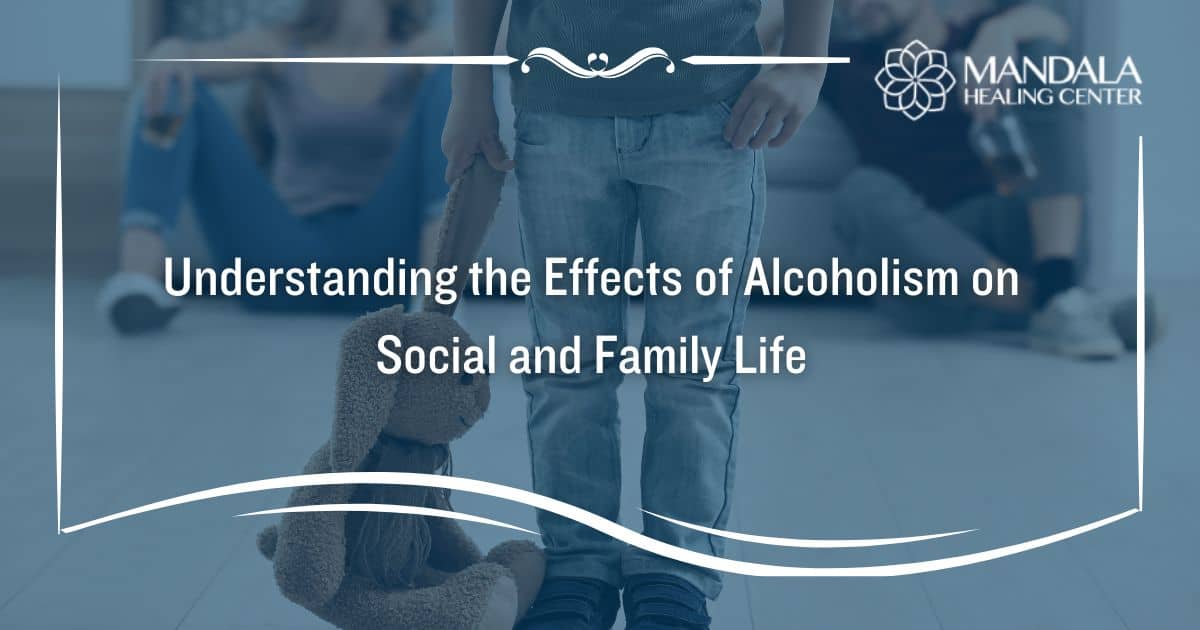Alcohol abuse and alcoholism can wreak havoc on every aspect of a person’s life, including their most important family relationships. People who misuse alcohol or live with addiction may make choices they usually wouldn’t. They may neglect children, spend money they can’t afford to lose, or exhibit antagonistic or violent behavior toward loved ones.
Alcoholism can also cause resentment and codependency between family members, which can keep families locked in a cycle of alcoholism that harms everyone involved.
There are many ways alcoholism affects family relationships and a person’s social life, but with the help of a trusted alcohol rehab program, you can get sober and rebuild your relationships. If you or someone you love struggle with alcohol misuse or alcoholism, reach out to the caring team at the Mandala Healing Center to learn about our holistic treatment programs.
The Link Between Alcoholism and Social Life Effects
Research from the National Institute on Alcohol Abuse and Alcoholism found that about 27% of people in the United States reported binge drinking–consuming a large amount of alcohol in a short period–or drinking heavily in the previous month.[1]
The effects of alcohol abuse on your social life can be significant. It’s estimated that about 1 in 10 children in the US are currently living with at least one parent who abuses alcohol.[2] Growing up with neglect or early exposure to alcohol abuse can put kids on a path toward social, educational, and emotional problems that follow them for life. It also makes them more likely to develop alcohol abuse or addiction at some point in their life.
Alcohol abuse also puts people at higher risk of being involved in an assault, either as the aggressor or the victim. Research shows that over 100,000 college students are the victim of a sexual assault each year–and this staggering number only reflects those who reported an assault.[3]
On a more individual level, people who drink heavily or misuse alcohol are more likely to neglect their relationships, isolate, or exhibit behaviors that are socially unacceptable. When a person lives with alcoholism, it is nearly impossible to have healthy, meaningful relationships. They often spend a great deal of time and energy getting alcohol, drinking, and recovering from alcohol use. Their health and ability to care for themselves deteriorate as their alcoholism progresses. In time, people with alcoholism may find themselves isolated and living with the dire consequences of drinking.
The Effects of Alcoholism on Family Life
Alcohol is addictive, and long periods of heavy drinking can lead to physical dependence and alcohol addiction. Alcoholism is a complete lack of control over your alcohol intake. People with alcoholism don’t choose to drink–they must drink for their bodies to function.
The effects of alcoholism on family life are profound and severe. People with alcohol addiction can not maintain healthy relationships and often cannot function in their daily lives.
Here are some of the significant effects of alcoholism on family life.
Neglecting responsibilities
People with alcoholism generally can’t focus on anything other than getting alcohol, drinking, and recovering from a hangover. They often neglect their responsibilities at home, work, or school. People with alcoholism can’t participate in maintaining a household, parenting, or being a loving partner. Their family members or partners may lose patience, feel neglected, or harbor deep resentment toward their addicted loved one.
Financial and legal problems
It’s common for those living with alcoholism to face serious, sometimes life-altering legal and financial issues related to things they did while intoxicated. People may lose their job, blow through savings to fund their drinking, or have to pay extensive legal fees associated with DUI cases. In a short period, families can lose any financial security they once had and face difficult decisions about the future.
Marital problems
Alcohol abuse and alcoholism are huge stressors within a marriage. A healthy, loving marriage requires both partners to be committed and focused on caring for each other. Alcoholism can drive a wedge between married people and cause significant problems, including:
- More conflicts
- Domestic violence
- Infidelity
- Financial problems
- Legal issues
- Stress
- Inequity in work, parenting, and other responsibilities at home
- Jealousy and resentment
- Divorce
The spouse of someone with alcoholism may struggle with feelings of guilt, anger, isolation, and worthlessness. They may blame themselves or try to compensate for their addicted partner’s absences and deficits.
Codependency
In a marriage where one partner struggles with alcoholism, it’s common for codependency to develop. Codependency can occur if the healthy partner takes responsibility for the addicted partner’s behaviors and becomes their caretaker. In many cases, the caretaker may forgo their own needs to focus on protecting their addicted partner from the consequences of alcoholism. This toxic pattern requires both spouses to seek treatment and find ongoing support.
Find Help for Alcohol Abuse and Alcoholism Today
If you or someone you love struggles with alcoholism, don’t wait another day to get the treatment and support you need. Reach out to the admission specialists at the Mandala Healing Center today to learn how our holistic alcohol rehab programs can help you work toward a healthier, sober future.
References:












